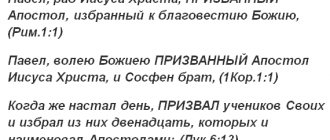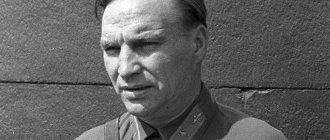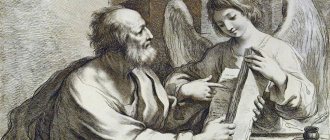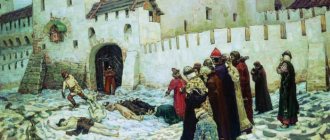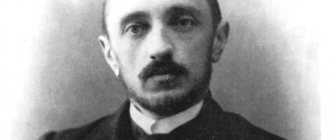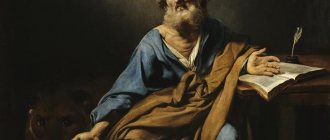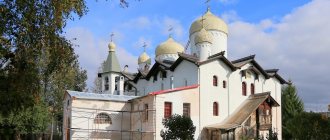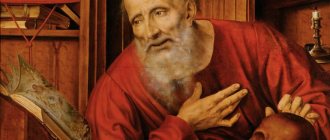“...and do not curse as it was not written by the Holy Spirit or an angel, but by a sinful and corruptible hand...”
From the preface to "The Apostle"
Ivan Fedorov
On March 1 (14), 1564, by order of Ivan the Terrible and with the blessing of Moscow Metropolitan Macarius, the first Russian precisely dated book was published - “ACTS OF THE HOLY APOSTLES, WRITTEN BY THE HOLY APOSTLE AND EVANGELIST LUKE.” Thanks to this publication, the exact date associated with the history of book printing in Russia is known.
Let us remember what time it was. Ivan Fedorov worked on “The Apostle” just when the famous St. Basil’s Cathedral was being built on Red Square by the great architects Barma and Postnik. A lot of construction was carried out in Moscow by craftsmen from Vladimir, from Pskov, from abroad, and the Annunciation Cathedral of the Kremlin was painted. These are the years when Rus' gained strength, acquired the features of a single centralized state, when trade expanded, cities grew, power was centralized, and the foundations of natural and technical knowledge were laid.
The Afterword to the first printed Apostle speaks of the great need for books for the new churches being created in Moscow and other cities, most of all in the newly conquered Kazan and its environs. Tsar Ivan Vasilyevich ordered to build “many churches” and buy sacred books for them “at the marketplaces”: psalms, gospels and apostles.[ii] But the handwritten books contained many errors and inaccuracies. “This also reached the ears of the king; Then he began to think about how to organize the printing of books, like the Greeks, and in Venice, and in Italy, and among other nations, so that from now on the holy books would be published in a corrected form.” [iii] Ivan the Terrible decided to open a state printing house in which texts would be carefully checked and edited.
One of the most talented Russian people of the 16th century began organizing the work to create a printing house. Ivan Fedorov. The printing work that began in the Kremlin was transferred to Nikolskaya Street, where a special building was built for the new printing house.[iv] For printing, it was necessary to cast fonts and make equipment.
The choice of “Apostol” for the first state printed publication was not accidental, because it was used to train the clergy. It contains the first examples of the interpretation of the Holy Scriptures by the disciples of Christ. Apostle (from the Greek apostolos - messenger) is part of the New Testament, the liturgical book of the Orthodox Church, which includes the Acts of the Apostles written by the Evangelist Luke, the conciliar letters of the apostles James, Peter, John, Jude, the letters of the Apostle Paul and the Apocalypse. It is believed that the Slavic translation of the Apostle was carried out by Cyril, Methodius and their disciples.
The text of “The Apostle” was edited and prepared for publication with the participation of Metropolitan Macarius. The publishers managed to avoid common mistakes when rewriting, and the language of the “Apostle” was cleared of outdated forms and words, thereby approaching the Church Slavonic language of later times.
The Moscow “Apostle” of 1564 is an innovative work in many ways. The Apostle does not yet have a title page, but there is an afterword that contains all the imprint of the book and the history of its publication. This afterword was most likely written by Ivan Fedorov himself and is of a secular nature. It can be considered the first printed journalistic work in the history of Russian literature. It should be noted that the afterword to the Apostle is the only document from which we can learn that Ivan Fedorov was a deacon of the Church of St. Nicholas Gostunsky in the Moscow Kremlin.
The Apostle has 267 leaves, each page has 25 lines. The engraving on page 14 is noteworthy. It depicts the Evangelist Luke in a triumphal arch. The engraving was printed from two boards. Presumably, the board for the frame was made by Ivan Fedorov himself; the engraver who depicted the figure of the evangelist bending over the manuscript is unknown.
In addition to the engraving with Luke, the book contains 48 engravings with floral ornaments. The Apostle’s ornamentation uses examples of the floral style of handwritten books from the Trinity-Sergius Monastery. In some elements of this ornament one can see a reflection of the Renaissance.
The text of “The Apostle” itself is typed in two colors in an even, beautiful font. While retaining the main features of the handwritten semi-character of the 16th century, Fedorov made the font more capacious. The full page of the first printed “Apostle” included 25 lines. It was also of great importance that the pioneer printer did not want to scare off readers with unnecessary novelty, and sought to bring the printed font closer to handwritten letters, to which Russian people had long been accustomed. When publishing the Apostle, Fedorov used two inventions characteristic of Russian book printing. Firstly, this is the principle of “crossing lines”, when diacritics are typed in letters separate from the letters. Secondly, an original method of printing in two runs (of paint) from one plate, apparently invented by Fedorov himself. First, the letters that were to be printed in red (cinnabar) were raised above the surface of the form and an impression was made. They were then removed from the typesetting, after which the main text was printed onto the same sheets with black ink.[v]
The font of the “Apostle” of 1564 is so perfect and attractive that it influenced Western Slavic printing. In the Moscow state, it was considered exemplary for half a century, until the beginning of the 17th century.
“The Apostle” is a book without typos. Academician D.S. Likhachev writes that in this book “so far not a single typographical error has been found (bad prints, loose lines, unstable printing ink) and not a single typographical error, without which not only in Russia, but also in Western In all subsequent centuries of printing, Europe did not manage to get by with a single publication.” This is evidence that the text was prepared very carefully. [vi] Printed by Ivan Fedorov and Pyotr Mstislavets, the book became a model for subsequent publications. The works of all Russian printers of the 16th century bear clear traces of the beneficial influence of Fedorov’s craftsmanship. But none of these works could surpass the technical and artistic level of the Apostle of 1564.
Researchers determine the circulation of the first "Apostle" in different ways - from 600 to 2000 copies. A copy of the first printed “Apostle” is available in the State Historical Museum in Moscow. It is remarkable that it has been preserved in its original binding. The binding boards are wrapped in leather with gorgeous gold embossing. On the top cover of the binding, in the center, is imprinted a double-headed eagle with the inscription: “John, by the grace of God, king and great prince of all Rus'.” On the eagle’s chest is a coat of arms with an image of Ivan the Terrible in a crown.[vii] Over 60 copies of “The Apostle” are kept in libraries and museums in different countries. This information does not cover private collections, but we can safely say that here we can only talk about a few books. For example, in February 1985, the Arkhangelsk Regional Museum of Local Lore acquired the “Apostle” of 1564, which was kept in the peasant Old Believer library of Anastasia Vlasevna Kukhtina.[viii]
“The Apostle” of 1564 is important not only as the first dated book in the history of Russian printing, but also as an unsurpassed masterpiece of ancient Russian printing, the highest achievement of printing skill of the 16th century, a monument of printing art, which was followed and imitated in the 16th and 17th centuries in Rus', and far beyond.
Grigoriev, E. I. ABOUT SOME CONTROVERSIAL ISSUES IN RUSSIAN BOOK PRINTING / E. I. Grigoriev // BULLETIN OF THE RUSSIAN ACADEMY OF SCIENCES. – 2001. – Volume 71, No. 5. – Page. 443-452.
[ii] M. N. Tikhomirov. The beginning of book printing in Russia. Access mode from 03/08. 2017 https://sobornik.ru/article/uistokov/uistokov02.htm
[iii] THE ACTS OF THE APOSTLES, WRITTEN BY THE HOLY APOSTLE AND EVANGELIST LUKE. Moscow, Printing Yard, 1564. Printers Ivan Fedorov and Pyotr Timofeev Mstislavets. Page 260 – 261: [Ivan Fedorov. Afterword about the publication of the book].
[iv] History of Russia: textbook / V. V. Moiseev | M.: Direct-Media, 2014. Page 166.
[v] Nemirovsky E. L. Invention of Johann Guttenberg. M., 2000. S. 166-167.
[vi] Access mode from 03/08. 2017 https://www.nmosk-lib.ru/news/virtualnye-vystavki/detail.php?ID=914
[vii] Protasyeva, T. “Begin to seek the craftsmanship of printed books...” / T. Protasyeva// Science and life. – 1964. – No. 3. – pp. 7-10.
[viii] Book monuments of the Arkhangelsk North Access mode from 08.03. 2022 https://virtmuseum.aonb.ru/z5/z5_ap64.html
Apostles in the Bible
Apostles in the Bible
- The signs of the Apostle appeared before you in all manner of patience, signs, wonders and powers. (2 Cor.12:12)
- someone sent on an official mission.
Thematic dictionary:
- A. PETER AND PAUL as the theme of Acts => Acts. 19:11 DEFENSE as the theme of Galatians => Gal. 1:10
- SELF-DEFENSE as the theme of 2 Corinthians => 2 Cor. 12:19.
- 1. The twelve disciples of Christ - His apostles received the great commission before His resurrection => Matt. 10:5-10
- his conversion and calling => Acts. 9:5,6; Acts 22:8-10; Acts 26:15-18
- Barnabas with Paul => Acts. 14:4
- apostleship is one of the gifts of God => 1 Cor. 12:28 ; Eph. 4:11
- saw the risen Christ => Acts. 1:21,22; 1 Cor. 9:1
Any power is from God
Separately, he speaks about submission to any authority from above, since it is always from God and disciplines people. You just need to remember this, not to blaspheme, but to do everything good prescribed by the authorities. Then there will be no punishment for those who have not done evil, and those who do good will have a reward.
At the end of the letter, Paul lists people who managed to work gloriously to spread the Christian faith, as well as to strengthen the Christian church. These are people of different classes from different cities and, most likely, had different religious views before converting to Christianity.
For whom was the book written?
The Christian view is that Luke wrote the Acts of the Apostles as a historical account of the early years of Christianity. The book is addressed to Theophilus, but it was intended to be written for a wider audience, including converts and potential converts.
Theophilus ("friend of God") may have been a real person or simply symbolized the believers. The laws seem to have been written to a Christian community that was beginning to identify itself as distinct from the Gnostic Christians, and the author appears to have been trying to bring together different strands of this Christianity.
The readership of the Acts of the Apostles likely included much of the "centrist" Christian community. This may have been aimed at supporters of the "Paulists" and Gnostics who were able to accept a centrist approach to Christianity. This shows that the Christians were friendly and loyal to Rome, so may also have been people meant to impress the Romans as a sign that Christianity was not subject to Roman rule.
Sacrament of Holy Communion
Paul speaks of receiving Holy Communion by recalling the Last Supper, during which bread, a symbol of the Body of Christ, was broken and wine was drunk as His Holy Blood. The first Christians, not knowing the secret meaning of this Supper, gathered to have dinner, and therefore got drunk and ate themselves or remained hungry, those who did not have enough. So they wasted their spiritual benefits, satisfying their flesh.
Separately, he says that in sermons and deeds, what is important is not knowledge and wisdom, not effort and hard work, but only love.
1. If I speak in the tongues of men and angels, but do not have love, then I am a sounding gossamer or a sounding cymbal.
2. If I have [the gift of] prophecy, and know all mysteries, and have all knowledge and all faith, so that [I can] move mountains, but do not have love, then I am nothing.
3. And if I give away all my property and give my body to be burned, but do not have love, it does me no good.
4. Love is patient and kind, love does not envy, love does not boast, it is not proud,
5. does not act outrageously, does not seek his own, is not irritated, does not think evil,
6. does not rejoice in untruth, but rejoices in the truth;
7. covers all things, believes all things, hopes all things, endures all things.
8. Love never fails, although prophecy will cease, and tongues will be silent, and knowledge will be abolished.
9. For we know in part, and we prophesy in part;
10. When that which is perfect has come, then that which is in part will cease.
Christian family
In the same letter he gives clear instructions about the family life of Christians. However, he does not insist on them, but only suggests them. If you follow them strictly, you will not fall into sin and will not defile yourself before God.
1. And what you wrote to me about is that it is good for a man not to touch a woman.
2. But, [to avoid] fornication, each one have his own wife, and each one have his own husband.
3. The husband show his wife due favor; likewise is a wife to her husband.
4. The wife has no power over her body, but the husband does; Likewise, the husband has no power over his body, but the wife does.
5. Do not deviate from each other, except by agreement, for a while, to exercise in fasting and prayer, and [then] be together again, so that Satan does not tempt you with your intemperance.
6. However, I said this as permission, and not as a command.
Paul also condemns idolatry, which continued to exist among the early Christians, since the families of many of them remained pagans. However, the apostle calls on Christians to flee from fellowship with them, so as not to fall into temptation. It is better to abstain physically than to perish spiritually.
History of creation [edit | edit code]
According to Gennady Sidorov, “The Apostle” was supposed to be a story “about a man whose life is senselessly crushed and crippled by the insensitive millstones of stupid power.”
. Having filmed 60% of the material, the director left with a scandal. At Sidorov's request, his name was removed from the credits. Instead, the credits contain the fictitious name Ivan Ivanov. After Sidorov left (since January 2007), Nikolai Lebedev worked on the series, whose name (at his own request and in connection with an agreement with Sidorov) is also not in the credits. Then Yuri Moroz joined the filming. Lebedev and Moroz spent the last two and a half months of filming (from mid-April to the end of June 2007) in parallel [1].
— “I’m ashamed to put my name on this! Only those scenes that I edited turned out good. Everything else is baby talk on the lawn. I laughed a lot. Yuri Moroz has a great talent for ruining great material. The twelfth episode completely negates the entire series, because it was made with the help of Zhenya Mironov, the “great” future director and screenwriter,”
- Sidorov sneers.
- “Naturally, I’m offended: this is my baby, but she turned out to be somehow cut off, without arms and legs.”
[2]
